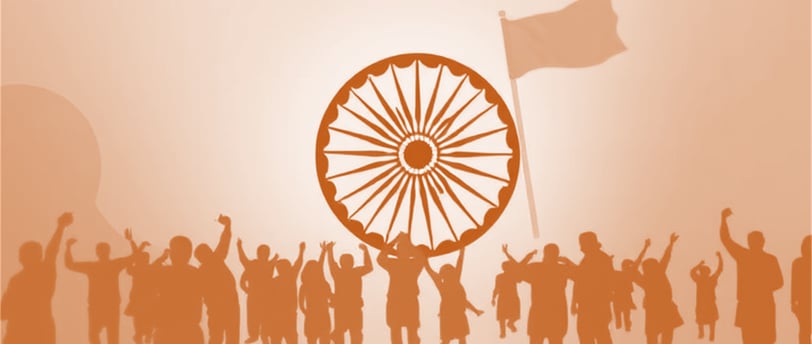26 January: India's Republic Day – A Celebration of Democracy and Patriotism
CULTURE


26 January: India's Republic Day – A Celebration of Democracy and Patriotism
## Introduction
26th January holds a special place in the heart of every Indian. It is a day of immense pride, reflection, and celebration. This day marks the adoption of the Indian Constitution and the transformation of India into a sovereign, democratic republic in 1950. Every year, Republic Day is celebrated with great enthusiasm across the nation, with grand parades, cultural events, and patriotic fervor filling the air. This article delves deep into the history, significance, celebrations, and the evolving role of Republic Day in modern India.
## Historical Background
The journey towards becoming a republic began long before 1950. India gained independence from British rule on August 15, 1947, but it was on January 26, 1950, that the Constitution of India came into effect, officially replacing the Government of India Act of 1935 as the country’s governing document.
### Why 26th January?
The choice of January 26 as Republic Day was not arbitrary. It was on this day in 1930 that the Indian National Congress, under the leadership of Jawaharlal Nehru, declared 'Purna Swaraj' (complete independence) from British rule. This historic day was thus chosen to honor the struggle for independence and to signify the true realization of self-rule.
## The Making of the Indian Constitution
Drafting a new constitution for a newly independent nation was a monumental task. The drafting committee, chaired by Dr. B.R. Ambedkar, took nearly three years to complete this comprehensive document. The Constitution laid the foundation for justice, liberty, equality, and fraternity, shaping India into the world's largest democracy.
### Key Features of the Constitution
1. Sovereign, Socialist, Secular, Democratic Republic – The preamble declares India as a sovereign nation, ensuring social and economic justice, secularism, and democracy.
2. Fundamental Rights and Duties – The Constitution grants citizens fundamental rights, including freedom of speech, equality, and protection against discrimination.
3. Directive Principles of State Policy – These guidelines ensure the state's responsibility in securing economic and social justice.
4. Federal Structure – India follows a federal system with powers divided between the center and the states.
## Republic Day Celebrations
Republic Day is celebrated across India with grandeur, but the highlight of the day is the Republic Day Parade held in New Delhi.
### Republic Day Parade at Rajpath
The parade at Rajpath, New Delhi, is a visual spectacle that showcases India's military strength, cultural diversity, and technological advancements.
- Flag Hoisting Ceremony – The President of India unfurls the national flag, followed by the national anthem and a 21-gun salute.
- March Past – The Indian Armed Forces, police, and paramilitary forces march in unison, displaying discipline and strength.
- Tableaux Representing States – Every state presents a tableau, highlighting its unique cultural heritage and achievements.
- Bravery Awards – Children and civilians who have demonstrated exceptional bravery are honored with awards.
- Flypast by the Indian Air Force – The celebration concludes with an awe-inspiring airshow by the Indian Air Force, leaving spectators spellbound.
### Celebrations Across the Nation
While Delhi hosts the grand parade, Republic Day celebrations take place in every corner of the country.
- Schools and colleges organize flag hoisting, cultural programs, and patriotic performances.
- Government institutions conduct ceremonies to honor the nation’s democratic values.
- Citizens celebrate by displaying the tricolor, singing patriotic songs, and participating in community events.
## The Chief Guest Tradition
One of the unique aspects of Republic Day is the tradition of inviting a foreign dignitary as the chief guest. This tradition symbolizes India's diplomatic outreach and strong international relations.
### Notable Chief Guests Over the Years
- 1950 – President Sukarno of Indonesia (First Republic Day chief guest)
- 1961 – Queen Elizabeth II of the United Kingdom
- 2015 – Barack Obama, President of the United States
- 2023 – Abdel Fattah el-Sisi, President of Egypt
## Republic Day in the Digital Age
With technological advancements, Republic Day celebrations have taken on a digital dimension. Live streaming of the parade, online patriotic campaigns, and social media tributes have amplified the spirit of patriotism among citizens, especially the younger generation.
### Role of Social Media
- Hashtags like #RepublicDay, #JaiHind, and #ProudToBeIndian trend across platforms.
- Citizens share historical facts, patriotic messages, and creative tributes online.
- Virtual celebrations, including digital flag hoisting and online quizzes, engage people across the globe.
## Challenges and Responsibilities
While Republic Day is a celebration of India’s democratic achievements, it also reminds citizens of their responsibilities.
### Challenges Facing India
1. Social Inequality – Bridging economic and social disparities remains a priority.
2. Environmental Issues – Climate change and pollution pose serious challenges.
3. Education and Healthcare – Access to quality education and healthcare for all is crucial.
4. Political Awareness – Encouraging citizens to participate in democracy actively.
### Responsibilities of Citizens
1. Respecting the Constitution – Upholding the values of justice, liberty, and equality.
2. Voting Responsibly – Exercising the right to vote and making informed choices.
3. Promoting National Unity – Embracing diversity and fostering communal harmony.
4. Contributing to Nation-Building – Participating in social service, environmental conservation, and economic growth initiatives.
## Conclusion
Republic Day is not just a national holiday; it is a reminder of the struggles and sacrifices that led to India's freedom and democratic status. It is a day to celebrate the country’s achievements, acknowledge challenges, and commit to a brighter future. As India continues to progress on the global stage, Republic Day serves as a moment of reflection, patriotism, and collective responsibility. Let us honor this day by upholding the ideals of democracy, working towards a better India, and fostering a spirit of unity and integrity.
Jai Hind!
